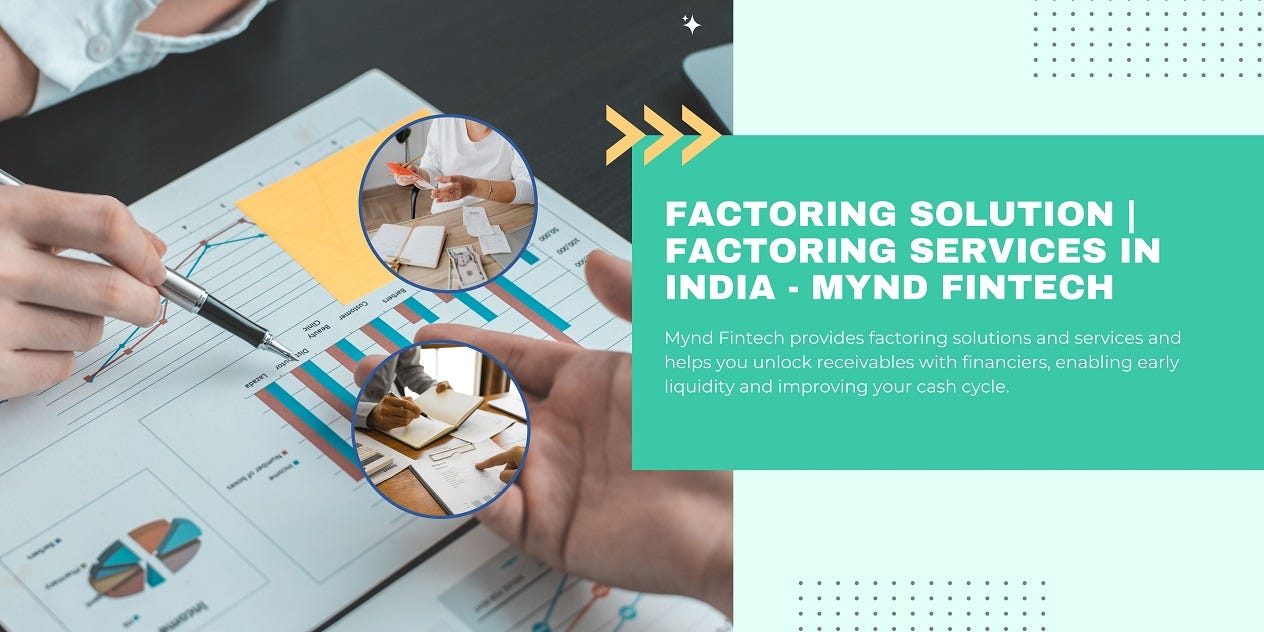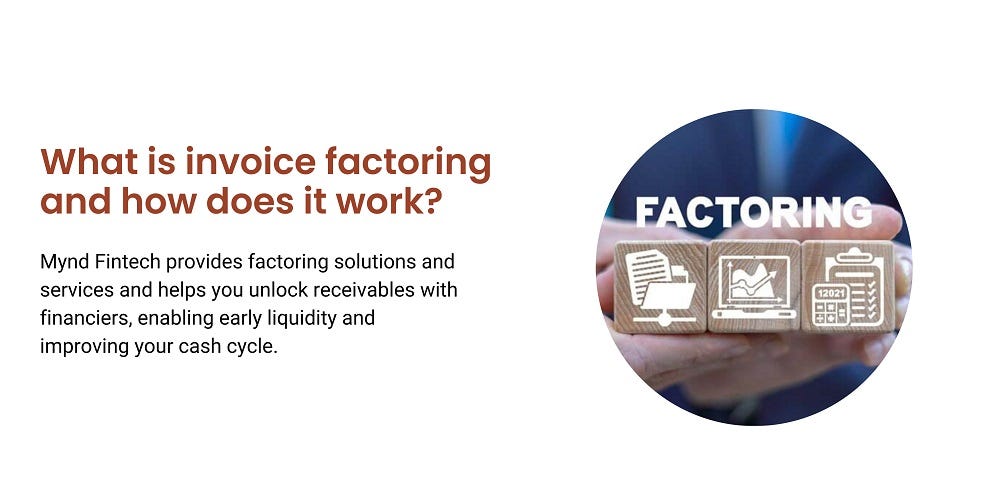Invoice factoring fintech is a type of business financing that involves selling unpaid invoices to a third party at a discount in exchange for an advance of cash. This allows businesses to improve their cash flow and revenue stability.
Fintech companies are moving towards factoring because it provides them with a way to generate income without taking on the risks associated with traditional lending. By partnering with factoring companies, fintechs can offer innovative solutions to businesses in need of working capital.
Through invoice factoring, companies can receive immediate payment for their invoices and let the factoring company collect payment directly from their customers. This article will explore the benefits and process of invoice factoring and its growing popularity in the fintech industry.

Credit: medium.com
What Is Invoice Factoring Fintech?
Invoice Factoring Fintech is a type of financial transaction where companies sell their accounts receivables or invoices to another party at a discount. It is a growing trend in the fintech industry as it provides businesses with access to immediate cash flow and helps improve their revenue stability.
Definition Of Invoice Factoring
Invoice factoring is a type of business financing that involves selling unpaid invoices to a third party at a discount in exchange for an advance of cash. This allows businesses to access the funds tied up in their accounts receivables and improve their cash flow. The factoring company will pay the business a percentage of the invoiced amount immediately and then collect payment directly from the customers.
Role Of Fintech In Invoice Factoring
Fintech, short for financial technology, is revolutionizing the world of invoice factoring. With the advent of fintech platforms, businesses now have access to streamlined and automated processes that make invoice factoring faster, more transparent, and efficient.
One of the main advantages of fintech in invoice factoring is the ability to access real-time data and analytics. Fintech platforms can provide businesses with valuable insights into their accounts receivables, allowing them to make informed decisions about which invoices to factor and when.
Furthermore, fintech has made it easier for businesses to find and connect with factoring companies. Online platforms and marketplaces have made the process of searching for and comparing factoring options more convenient. Businesses can now easily find the best factoring rates and terms that suit their specific needs.
Another significant role of fintech in invoice factoring is the automation of processes. Fintech platforms can handle tasks such as invoice verification, credit checks, and payment processing, reducing manual errors and administrative burdens. This automation not only saves time but also improves accuracy and efficiency.
Moreover, fintech has enhanced the overall customer experience in invoice factoring. Businesses can access their accounts, track the status of their invoices, and receive funds faster through user-friendly online portals or mobile applications. This increased transparency and accessibility have made invoice factoring a more seamless and hassle-free process.
In conclusion, fintech has emerged as a game-changer in the world of invoice factoring. It has transformed and optimized the traditional factoring process, offering businesses a more efficient, transparent, and convenient way to access the funds tied up in their accounts receivables.
Benefits Of Invoice Factoring Fintech
Invoice factoring fintech offers several benefits that can greatly improve the financial stability and growth of a business. From improved cash flow to streamlined accounts receivable management, these benefits make invoice factoring an attractive option for many businesses.
Improved Cash Flow
One of the primary benefits of invoice factoring fintech is the improved cash flow it provides. By selling their accounts receivables or invoices to a factoring company at a discount, businesses can access immediate capital and no longer have to wait for their customers to pay. This influx of cash allows businesses to cover their expenses, pay their bills on time, and invest in growth opportunities without the stress of a cash flow crunch.
Streamlined Accounts Receivable Management
Another benefit of invoice factoring fintech is the streamlined management of accounts receivable. When a business partners with a factoring company, the factoring company takes on the responsibility of collecting payment directly from the customers. This relieves the business of the time-consuming and sometimes challenging task of chasing down payments. As a result, business owners can focus their time and energy on core operations, sales, and growth strategies.
Additionally, the factoring company’s expertise in accounts receivable management ensures that invoices are processed efficiently and accurately. They have systems in place to handle all aspects of invoicing, including sending reminders, tracking payments, and resolving any disputes. This level of efficiency and professionalism can help businesses maintain positive relationships with their customers and improve overall customer satisfaction.
In conclusion, invoice factoring fintech offers significant benefits for businesses. Improved cash flow and streamlined accounts receivable management are just a few of the advantages that businesses can enjoy by leveraging this financial tool. By partnering with a reputable factoring company, businesses can gain access to immediate capital, alleviate cash flow challenges, and maximize their growth potential.
Why Is Fintech Moving Towards Factoring?
Fintech is moving towards factoring because it allows companies to sell their accounts receivables at a discount, providing them with immediate cash flow. This innovative approach to financing helps businesses improve their revenue stability and manage their cash flow effectively.
Increasing Demand For Alternative Financing Options
Fintech companies are increasingly focusing on factoring as an alternative financing option due to the growing demand from businesses. Traditional financing methods often come with lengthy application processes, strict eligibility criteria, and limited credit availability. In contrast, invoice factoring allows businesses to leverage their outstanding invoices to access immediate cash flow. This flexible financing option has gained popularity among small and medium-sized enterprises (SMEs) that are looking for faster and more accessible funding solutions.
Efficiency And Automation In The Invoice Factoring Process
One of the key reasons why fintech is moving towards factoring is the efficiency and automation it brings to the invoice factoring process. Traditional factoring involves manual paperwork, lengthy approval processes, and human intervention at various stages. Fintech companies are leveraging technology to streamline and automate these processes, reducing the time and effort required for both businesses and financial institutions.
Through sophisticated algorithms and data analytics, fintech platforms can quickly evaluate the creditworthiness of the invoices and provide instant funding decisions. This automation not only speeds up the financing process but also improves accuracy and reduces the risk of errors.
Moreover, fintech platforms offer user-friendly interfaces that allow businesses to easily upload their invoices, track payment statuses, and manage their financing needs. The transparency and accessibility offered by these platforms are revolutionizing the traditional factoring industry and attracting businesses towards this modern and efficient financing option.

Credit: www.facebook.com
How Does Invoice Factoring Work?
Invoice factoring is a financial transaction in which a company sells its accounts receivables or invoices to another party at a discount. This Fintech solution helps businesses improve cash flow and generate income without the risks associated with traditional lending.
Selling Invoices To A Third Party
Invoice factoring involves a business selling its outstanding receivables or invoices to a third-party financial company. This third party, often referred to as a ‘factor’, purchases the invoices at a discount, providing the business with immediate access to a portion of the invoice amount.
Receiving Immediate Payment And Collection From The Customers
Upon purchasing the invoices, the factor assumes responsibility for the collection of payments from the customers. This allows the business to receive immediate cash flow without having to wait for the customers to pay their invoices. The factor then collects the full invoice amount from the customers, ensuring a seamless and timely payment process.
Choosing The Right Invoice Factoring Fintech Provider
Factors To Consider
When selecting an invoice factoring fintech provider, there are several important factors to consider in order to ensure that the chosen provider aligns with the specific needs of your business. By carefully evaluating the following key factors, you can make an informed decision that will ultimately contribute to the success and seamless operation of your company.
Comparison Of Top Invoice Factoring Fintech Companies
Several leading invoice factoring fintech companies stand out in the industry, each offering varying features and benefits. Here’s a comparison of some of the top invoice factoring fintech companies:

Credit: medium.com
Frequently Asked Questions On Invoice Factoring Fintech
What Is Fintech Factoring?
Fintech factoring is a type of financial transaction where a company sells its invoices at a discount to another party. It helps improve cash flow and revenue stability.
Do Banks Do Invoice Factoring?
Yes, banks do offer invoice factoring to businesses for generating income without taking on risks.
What Is Invoice Finance Factoring?
Invoice finance factoring is when a company sells its invoices at a discount to improve cash flow.
How Much Does It Cost To Factor Invoices?
Invoice factoring costs typically range from 1% to 5% of the invoice value. This fee covers the services provided by the factoring company, such as advancing cash for the invoice and handling the collections process. The exact cost may vary depending on factors such as the creditworthiness of the customers and the volume of invoices being factored.
Conclusion
Invoice factoring fintech is revolutionizing the way businesses manage their cash flow and improve revenue stability. By selling outstanding invoices to a third party at a discount, companies can access immediate funds to meet their financial obligations. This shift towards fintech factoring is driven by the need for faster and more efficient financing options that traditional banks may not offer.
With the ability to generate income without taking on the risks associated with traditional lending, factoring offers a win-win solution for both businesses and investors. Overall, invoice factoring fintech is reshaping the small business finance landscape and providing innovative solutions for businesses in need of working capital.